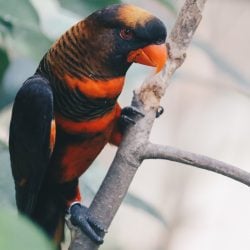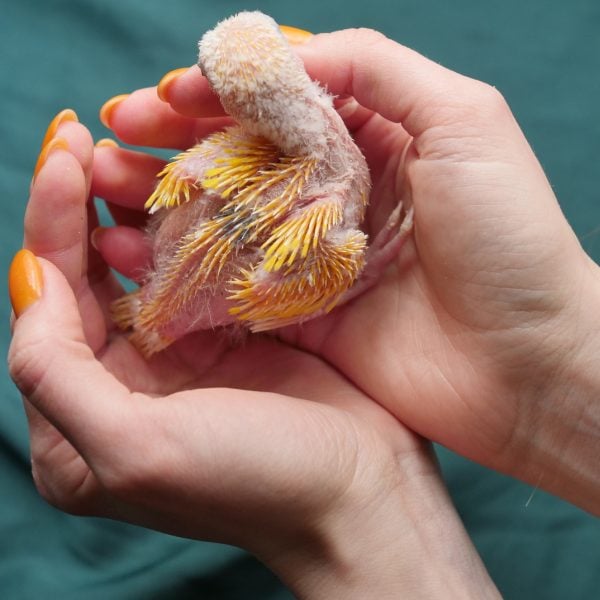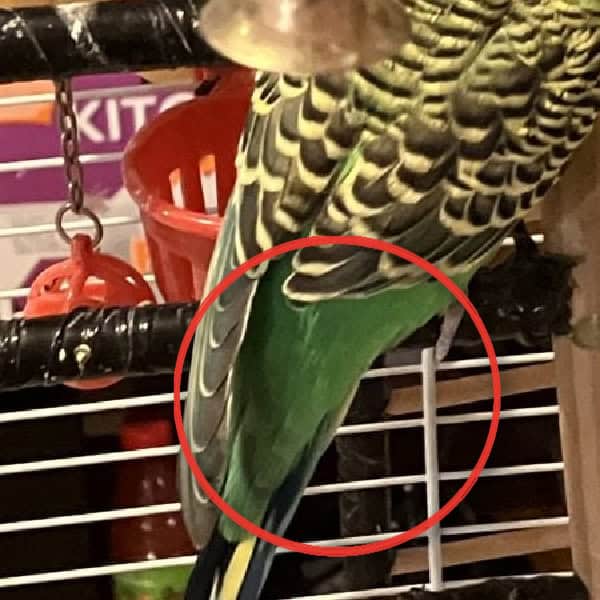
blue-budgie-flower
Follow up to Using Homeopathic Remedies for Birds
Last Updated on by Mitch Rezman
I understand what you’re getting at and I appreciate it. They aren’t homeopathic remedies they are flower essences.
The bird would NOT come out of the cage at all in the last four homes and would bite viciously.
He was phobic of everything.
I tried the parrot training recommendations from birdtricks.com and he would not come out, would not step up, and bloodied himself in fright.
He was terrified and would scream and shake. He simply wouldn’t let you near him. He lived with a vet tech for four years who could do nothing with him and an avian rescue org for four years that said he was a “basket case”.
Think about it, your birds ONLY thing that it can really call its own, is its cage.
It is its sanctuary, its bedroom.
If you can avoid it, you should never try to remove your bird from his cage involuntarily.
Just open the door with a sweet greeting and walk away.
Your bird will come out when it wants to.
The perch on the door, placed low is a VERY good option.
When you see the bird on the perch you walk over slowly, talk sweetly and open the door.
The bird is now OUTSIDE of the cage and in YOUR space, much easier to pick him up if he lets you, if not, let him be. He can and will waddle over to you at some point.
Is he perch trained? Meaning, will he get on a perch without running from it?
If not it is very important to have this training. If you can get him into a “laddering” lesson, (stepping up from hand to the next hand to the next, saying “step up” every time, slip in a perch for one of the steps, and then off again onto your hand.
Make sure you hand in flat with your fingers together and tight, not loose so he can grab one alone, bigger is good.
Perch training is so important to have your bird know. For example, he flies up high on a shelf and you can’t reach him or he falls behind a cabinet and you can’t move it. If you can lower a long perch, or reach up with on, he would know that if he climbs onto it you can lift him out of the confined or too high space.
To calm him, we offer a product at Windy City Parrot that is very good, safe and calms your bird. It was recommended to us by our customers Avitech Avicalm (discontinued).
It is a food additive and I have been told it works in just a couple days and we can’t be out of it. One of our customers with a cockatoo on the verge of mutilating itself showed a tick down of stress within 2 days. We love to hear that. And it is for birds.
I hope some of this helps.
Catherine
I’m with Mitch – there are no proper randomized, double-blind studies on most “natural” remedies for humans that I’ve ever seen appear in medically respected journals like the New England Journal of Medicine or the Lancet.
I’m not completely against natural remedies for humans, because even a placebo works 40% of the time, and as long as they are not harmful what the heck…. but in such a small animal, with a different metabolic and elimination system from humans why take the risk? It’s the same rationale as not giving high fat foods to your dog – they don’t metabolize fat the way humans do and it can play havoc on their health. Very few medications get tested on children for the same reason.
Just because something is “natural” or “homeopathic” doesn’t necessarily mean there is no active ingredient in it that could cause harm – aspirin comes from birchbark…. digitalis comes from a plant called foxglove… I’m sure there are many more examples…
I have him singing, dancing and smiling at me now in just a few weeks.
His nervous system is quicker which makes him very afraid of anything.
What good is living your entire lifespan if you have a poor quality of life? I do not believe they are bad these flower essences.
All of the things everyone suggested on this thread behavior-wise did not work with this little guy.
I asked a Bach Flower Practitioner what to do she has parrots herself and she recommended I give him the flower essences.
I have worked with dogs also and I can say that sometimes their nervous system is super fast. Sometimes I use bodywork techniques to disperse the energy buildup on dogs so they can carry on living and adjusting to their environment. In the case of the sensitive Grey, I could not touch him.
Should I have waited another 5 years and let him stay in his cage terrified, and aggressive, or would he just get passed along to another home to have the same scenario played out again?
I am an animal behaviorist. I don’t rely on medicines but sometimes medications, remedies, and other approaches are needed when conventional approaches fail. I am an herbalist and I know that natural medicines can be deadly. Your responses however are fear based which I understand. We have to protect our birds, we love them.
Jasper is doing well now.
Isn’t that wonderful? He has only been on the flower essences since 6/13 and it is 6/29.
Do you think that it was a bad idea?
Well if you disagree so be it.
He is happy now and I don’t feel I acted irresponsibly as I have used these in the past and since they only act on the emotional body as they are so gentle I felt I needed to do something.
I tried everything else. I guess that is the final note for me. Have a wonderful day and wish you a healthy happy Grey experience.
Author Profile
Latest entries
 The Traveling BirdJune 26, 2025Can You Name 5 Parrot Species That Are Living Wild in the USA?
The Traveling BirdJune 26, 2025Can You Name 5 Parrot Species That Are Living Wild in the USA? Bird BehaviorJune 26, 2025How is it Parrots Are Problem Solvers Social Animals and Even Use Tools?
Bird BehaviorJune 26, 2025How is it Parrots Are Problem Solvers Social Animals and Even Use Tools? Bird & Parrot AnatomyJune 25, 2025How a Tiny Chemical Modification Makes Parrots Nature’s Living Paintings
Bird & Parrot AnatomyJune 25, 2025How a Tiny Chemical Modification Makes Parrots Nature’s Living Paintings PigeonsJune 20, 2025How Do Parrots Thrive in Cities Outside Their Native Habitats?
PigeonsJune 20, 2025How Do Parrots Thrive in Cities Outside Their Native Habitats?


